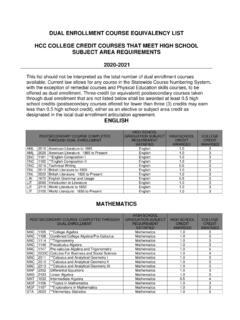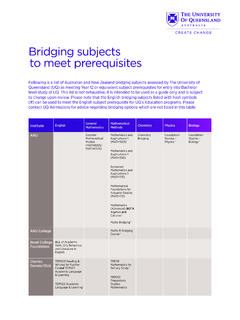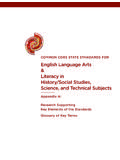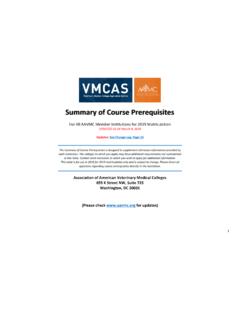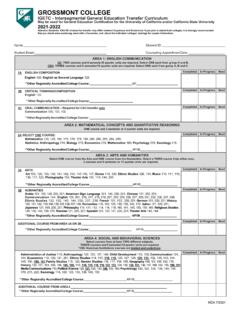Transcription of Factors Associated with Failure in Accounting: A Case ...
1 International Journal of Higher Education Vol. 8, No. 6; 2019. Factors Associated with Failure in Accounting: A Case Study of the Omani Students Rodrigo M. Velasco1. 1. Faculty of Business and Management Studies, Gulf College, Muscat, Oman. Correspondence: Rodrigo M. Velasco, Faculty of Business and Management Studies, Gulf College, Muscat, Oman. E-mail: Received: September 15, 2019 Accepted: October 12, 2019 Online Published: October 14, 2019. URL: Abstract Anywhere in the world, accounting is highly regarded as one of the most challenging subjects in business programs.
2 This is usually Associated with a high Failure rate; a pressing issue that deserves an intervention. This paper analyzed the Factors Associated with Failure in accounting as experienced by a college in the Sultanate of Oman in two-folds: teachers' and students' perspectives. The sequential explanatory mixed method of research was utilized through the quantitative survey and focus group discussion (FGD) supplemented by an interview. Based on the students'. assessment of the challenges and study habits, the teachers' attribution of Failure to students' skills and capabilities is affirmed.
3 It is very much recommended that teachers go back to the basic reinforcement of skills-building strategies to help the students pass the module. Since this is a prelude to a higher analysis, further studies of the same nature are highly encouraged. Keywords: Factors for Failure , accounting, Failure in accounting, case study of Omani students 1. Introduction Anywhere in the world, accounting is highly regarded as one of the most challenging subjects in business programs. This is usually Associated with low passing and high Failure rates.
4 Various studies around the world proved this phenomenon: 42% Failure in cost accounting in one university in Brazil from 2008 until 2013 (Borges, Santos, Abbas, Marques & Tonin, 2014); repeating students in financial accounting and management accounting in South Africa (Fakoya, 2014); low academic performance in the introductory accounting in Puerto Rico (Principe, 2005); Failure in cost accounting in one of the colleges in Kuwait (Alanzi, 2015); and poor performance of non-accounting students in financial accounting in a university in Malaysia (Muda, Hussin, Johari, Sapari & Jamil, 2012).
5 Taking this generally within the bounds of global standard, accounting seems feared among business subjects. Taking this otherwise, Failure rate indicates an underlying concern for both the teachers and students. Academicians and researchers alike pinpoint numerous Factors that lead to high Failure in accounting. It can be summed up to student- Associated Factors and teacher Factors . For Gracia & Jenkins (2002), these Factors mainly focus on the personal responsibility of the learners and the role of tutors and their expectations.
6 On the students' viewpoint, Failure can be Associated with three major personal aspects: background knowledge, challenges faced in learning the subject and study habits. Currently, the new secondary curriculum offers basic accounting that equips students entering collegiate business programs with a basic understanding of the concepts and conventions. However, the Failure rate in tertiary accounting is still on the rise. Srdar (2007) believes that there is a gap between learning and practice. Meanwhile, Borges, Santos, Abbas, Marques & Tonin (2014) firmly associate this with commitment and procrastination of students.
7 The case of Arab students slightly differs in some aspects. Researchers identified two main pressures in teaching accounting to Arab students: English and educational culture. This is affirmed by Andrade (2006) who noted that academic achievement is primarily attributed to English proficiency and culture. The use of English as a medium of instruction raises major challenges as lexical knowledge insufficiency (Al-Sohbani & Muthanna, 2013), difficulty in spelling (Bowen, 2011) and lack of background knowledge (Elttayef & Hussein, 2017).
8 In the study conducted by Almajed & Hamdan (2015) to measure the effect of studying in Arabic and English languages, the accounting students understand better in their native language than English. Furthermore, academic performance is highly influenced by English language proficiency. Published by Sciedu Press 157 ISSN 1927-6044 E-ISSN 1927-6052. International Journal of Higher Education Vol. 8, No. 6; 2019. The same scenario exists in one college in Oman offering an introductory course in accounting for students specializing in Business Management, Marketing and Economics.
9 This particular module has two assessments: midterm and final examinations that contain both theoretical and mathematical concepts. The scope of the module pertains to basic accounting concepts and basic managerial accounting concepts. At the end of the second semester of the academic year 2017 2018, the module outcome posted a pass rate of 50%, enough to be branded as toughest'. due to its percentage of Failure every semester. Relevant to this is the rising number of repeaters for second and third attempts and the students exiting programs due to failures.
10 It has raised major concerns for both the teachers and external examiner as to intervention plans to address the issue. This shared module is common and compulsory to all business students in various specializations. This paper is a prelude to a higher analysis of the most appropriate methodology to address the issue of high Failure in accounting subjects. The major objective of this study is to analyze the main cause of high Failure in two-folds: teachers' and students' perspectives. Through the mixed method of research, the students' assessment used quantitative design while the teachers' assessment of the issue was initialized through the focus group discussion (FGD).










